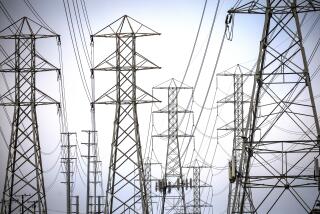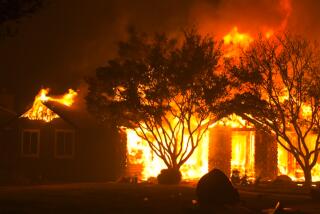DWP rate plan OKd
The Los Angeles City Council gave preliminary approval Wednesday to restructuring electricity rates for city utility customers during the summer months, reducing rates in high-temperature neighborhoods and adopting a tiered rate system that would punish big energy users and reward conservation.
The plan would give price breaks from June through September to customers living in âhot zonesâ in the San Fernando Valley, on the Eastside and in portions of South Los Angeles. The zones are areas that have average summertime temperatures above 80 degrees.
During those summer months, the Department of Water and Power would also implement a three-tiered rate system citywide that could mean higher electricity bills for up to 20% of the utilityâs customers.
The tiered rate structure would increase the price per kilowatt-hour when households use higher amounts of energy. The increase in rates would be relatively modest, from 7 cents per kilowatt-hour for the first batch of power to 12 cents per kilowatt-hour for the heaviest residential power users in the third tier. Rates would remain at a flat 7 cents per kilowatt-hour during the other eight months of the year.
H. David Nahai, the DWPâs chief executive officer, said the rate changes were designed to be revenue neutral, meaning the agency would not make money because some customers would pay more and some would pay less. He said the goal of adopting a tiered rate system is to encourage energy conservation.
âI do not expect it to raise more money at all,â Nahai said. âWe expect that a powerful conservation message will be carried, and people will use less electricity.â
The rate changes are scheduled to come before the council next week for final consideration. If approved, they will take effect in July 2009.
At the councilâs insistence, the DWP will be required to reverify the findings of a 1994 UCLA study that the department used to define hot zones. Currently, Studio City and Toluca Lake are not included in the Valley hot zone, and Councilwoman Wendy Greuel of Studio City voiced concern that micro climates within the city might have changed since 1994. DWP officials also said they would commission a new temperature study soon.
Councilwoman Jan Perry, whose district includes downtown and portions of South L.A., said that many residents might see a rate increase under the changes but that the increase would be more equitable. The DWP now charges residential customers a flat rate of 7.3 cents per kilowatt-hour for all electricity use. Those who conserve or donât consume a lot of electricity are, in effect, subsidizing heavy power users, including those with big homes in the suburbs. âThere has to be consequences for their choice,â Perry said.
Mary Garcia of North Hollywood urged the council to postpone implementation of the new rate system for a few years. She said residents would be hit with higher electricity bills at the same time the city plans to increase trash collection fees and while people are grappling with higher gas prices, food prices and medical costs.
âIt doesnât leave much in the bank at home, does it?â Garcia told the council. She said the council should explore alternatives such as âsmart meters,â which would give customers real-time access to their metered electricity use and let them take steps to conserve.
Rhonda Mills of the Center for Energy Efficiency and Renewable Technologies in L.A. praised the council for its unanimous vote in favor of the rate changes. She said that tiered rates are a proven way of encouraging conservation.
--
More to Read
Sign up for Essential California
The most important California stories and recommendations in your inbox every morning.
You may occasionally receive promotional content from the Los Angeles Times.











